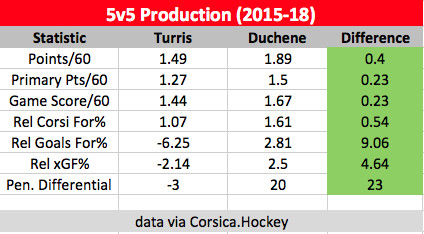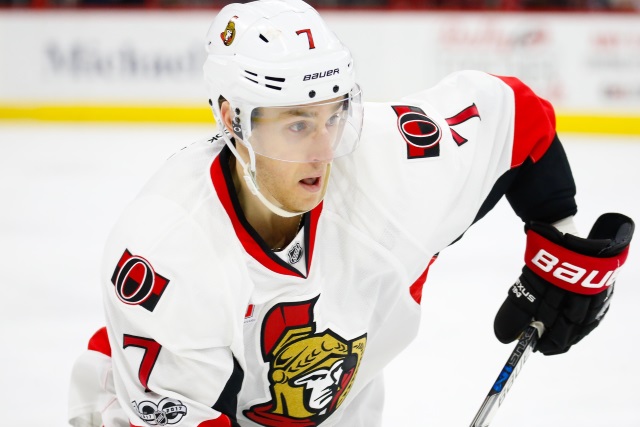On Sunday afternoon, the Colorado Avalanche, Ottawa Senators, and Nashville Predators came together on a rare three-team blockbuster trade that featured nine pieces.
Colorado receives defenseman Sam Girard, winger Vladislav Kamenev, center Shane Bowers, goaltender Andrew Hammond, Ottawa’s 2018 1st (protected), Nashville’s 2018 2nd, and Ottawa’s 2019 3rd round pick.
Ottawa receives center Matt Duchene.
Nashville receives center Kyle Turris, who immediately put pen to paper on a six-year extension worth $36 million.
There are a lot of moving parts (literally) and layers to this trade, so I’m going to share my thoughts on a team-by-team basis.
From Colorado’s perspective
- Sam Girard is a really nice get for the Avalanche. He was absolutely dominant in the QMJHL over the last two seasons — he tallied 180 in 152 combined regular season and playoff games during that stretch — and is off to a nice start to his NHL career. The sample size is very small, but he put up three points in five games with Nashville while posting a 49 Corsi For% and 51 Scoring Chance For%. He can skate, he can move the puck, and he has all the makings of a long-time top-4 defenseman, which the Avalanche are desperate for.
- Kamenev is another really promising player. He led all 20-year-old AHLers in points and primary points last season and is off to another solid start with eight points through 10 games this season. The highly skilled winger probably isn’t far off from NHL duty and has the potential to be a top-6 forward who, in time, could replace some of the offense lost by trading Duchene.
- I know Bowers was a 1st round pick a few months ago, but I’m not as high on him as some. The book on him is he has a great motor, is defensively responsible, and has some skill but probably doesn’t project to be much of a scorer at the next level. He could still be a nice player, but I think people overvalue him as a prospect because he has the 1st round tag attached to him. I could be wrong, but he’s probably a low-ceiling guy as far as 1st round picks are concerned.
- Overall I think Colorado did well getting a defenseman with top-4 potential, a forward with top-6 potential, a former 1st round pick in Bowers, a capable backup goalie (though one the Avs don’t need), and an additional 1st, 2nd, and 3rd for a player who a) didn’t want to be in Colorado and; b) was going to leave for nothing after the 2018-19 season. Many criticized Joe Sakic for how he handled Duchene’s trade request, but it seems to have worked out fairly well.
From Ottawa’s perspective
- On the surface, Kyle Turris, a former 1st round pick (Bowers), a 1st, and a 3rd seems like *a lot* to give up for Duchene but, when you dig a little deeper, I think it makes sense. The Sens weren’t going to give Turris the term he wanted, so it quickly became clear he was going to walk at the end of the year. Parlaying Turris and some futures to acquire a better player, a younger player, and a player with an extra year of control seems like a good idea. Some will argue Turris is better, or at least in the same ballpark as Duchene, but the numbers suggest the latter is more effective.
 As you can see, Duchene has been a more efficient point producer at 5v5, where most of every game is played. He has better underlying numbers, and a much better penalty differential – a noticeable upgrade.
As you can see, Duchene has been a more efficient point producer at 5v5, where most of every game is played. He has better underlying numbers, and a much better penalty differential – a noticeable upgrade.
- Okay, Duchene is an upgrade. Is the difference big enough upgrade to warrant a 1st (Bowers), another 1st, and a 3rd? Time will tell, but I don’t have much of a problem with the price. As mentioned above, I don’t think Bowers’ ceiling is overly high. Let’s say he turns into a solid 3rd liner, which may be optimistic. You can find those in free agency every year for $1.5 million. I’m not concerned there. Then there’s an additional 1st, which the Sens have protected (if it’s a top-10 pick, they can keep it), and a 3rd. The 1st could be good, but it’ll take years to find out, and the 3rd has about a 20% chance of turning into something useful. The Sens want to improve their team, and show Erik Karlsson they’re committed to winning, which is more important than anything, so Duchene seems worth that price.
- Bowers, a 1st, and a 3rd is a lot of futures to part within one deal. However, the Sens didn’t trade Thomas Chabot, Logan Brown, Colin White, or Filip Chlapik, their four prospects with the most potential. Duchene is unquestionably a 1st line talent and almost certainly a long-term piece — the Sens wouldn’t have traded for him if they didn’t plan on paying up when it’s time — so to get him without trading any of their *top* prospects seems like a win.
From Nashville’s perspective
- Nashville is off to a 7-5-2 start but don’t let that fool you — they haven’t been playing overly well. They lead the league in penalties and have struggled mightily at 5v5. They rank tied for last in expected goals for/60 minutes played and 27th in expected goals for%. No Ryan Ellis or Nick Bonino certainly hurts, but they needed a boost and Turris should provide just that. Turris tallied at least 55 points in each of his three full seasons and is on the right track to do that again having piled up nine points in 11 games thus far. He’ll give them some needed pop, and he’s also capable of logging tough minutes against opposing teams best players.
- With the addition of Turris, the Predators can now run out a 1-2-3-4 punch of Ryan Johansen-Turris-Nick Bonino-Calle Jarnkrok when healthy. That will be tough for any team to match up against. With arguably the best top-4 in the NHL on defense, the Predators are stacked at the two most important positions.
- Girard is likely to be a very good NHL player and Kamenev is very promising, but the Predators added an established top-6 center to a team that was in the Stanley Cup Final a year ago without giving one regular off their roster. Whenever you can make that kind of deal, you have to pull the trigger.
- The Predators have an incredible core of skaters featuring the likes of Filip Forsberg, Viktor Arvidsson, P.K. Subban, Roman Josi, Mattias Ekholm, Ryan Ellis, Johansen, and Turris. Of that bunch, Ellis is the only player not under contract for at least three seasons. This team is ready to contend for the foreseeable future.
Conclusion
In most cases, I think it’s pretty easy to at least lean in one direction on which side won or lost the deal. To me, this is not one of those cases. Ottawa and Nashville both clearly improved now, which was their goal, while Colorado accumulated a nice bundle of assets to help them moving forward. This was a great trade, and I can’t wait to see how things play out moving forward.
Written by Todd Cordell (@ToddCordell)



